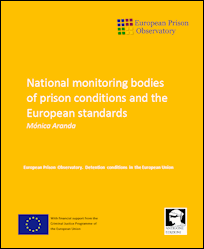Articles
Prison monitoring by the civil society: a document for European institutions
On Monday 28 June 2021, Antigone was invited to participate in a meeting organised by the Committee on Civil Liberties, Justice and Home Affairs (LIBE) of the European Union.
The pandemic has shown even more clearly the need for an external view and expertise, to complement independent inspection bodies and playing a role that does not overlap with theirs.
Indeed, the sudden interruption of information between inside and outside, the lack of institutional transparency during the pandemic, the request for help from civil society in strategic areas show that civil society monitoring initiatives are essential for the respect of the rights of inmates and for the prevention of torture and abuses.
On behalf of the European Prison Observatory, and with the support of the Worlrd Organisation against Torture, Antigone has asked to the European institutions to put pressure on Member States to allow civil society organisations access to prisons.
To read the document presented to the European institutions, see here.





